五年级英语知识点总结
冀教版五年级英语知识点总结
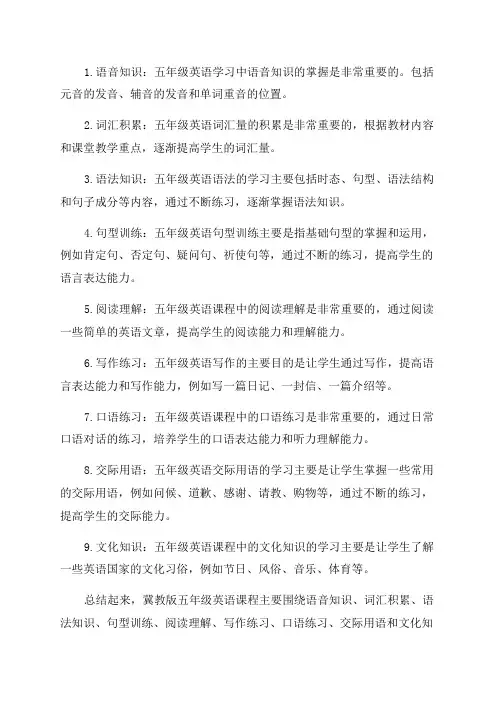
1.语音知识:五年级英语学习中语音知识的掌握是非常重要的。
包括元音的发音、辅音的发音和单词重音的位置。
2.词汇积累:五年级英语词汇量的积累是非常重要的,根据教材内容和课堂教学重点,逐渐提高学生的词汇量。
3.语法知识:五年级英语语法的学习主要包括时态、句型、语法结构和句子成分等内容,通过不断练习,逐渐掌握语法知识。
4.句型训练:五年级英语句型训练主要是指基础句型的掌握和运用,例如肯定句、否定句、疑问句、祈使句等,通过不断的练习,提高学生的语言表达能力。
5.阅读理解:五年级英语课程中的阅读理解是非常重要的,通过阅读一些简单的英语文章,提高学生的阅读能力和理解能力。
6.写作练习:五年级英语写作的主要目的是让学生通过写作,提高语言表达能力和写作能力,例如写一篇日记、一封信、一篇介绍等。
7.口语练习:五年级英语课程中的口语练习是非常重要的,通过日常口语对话的练习,培养学生的口语表达能力和听力理解能力。
8.交际用语:五年级英语交际用语的学习主要是让学生掌握一些常用的交际用语,例如问候、道歉、感谢、请教、购物等,通过不断的练习,提高学生的交际能力。
9.文化知识:五年级英语课程中的文化知识的学习主要是让学生了解一些英语国家的文化习俗,例如节日、风俗、音乐、体育等。
总结起来,冀教版五年级英语课程主要围绕语音知识、词汇积累、语法知识、句型训练、阅读理解、写作练习、口语练习、交际用语和文化知
识等方面进行学习。
通过综合运用这些知识点,提高学生的语言表达能力和语言运用能力,达到扎实掌握英语基础知识的目的。
五年级英语知识点总结
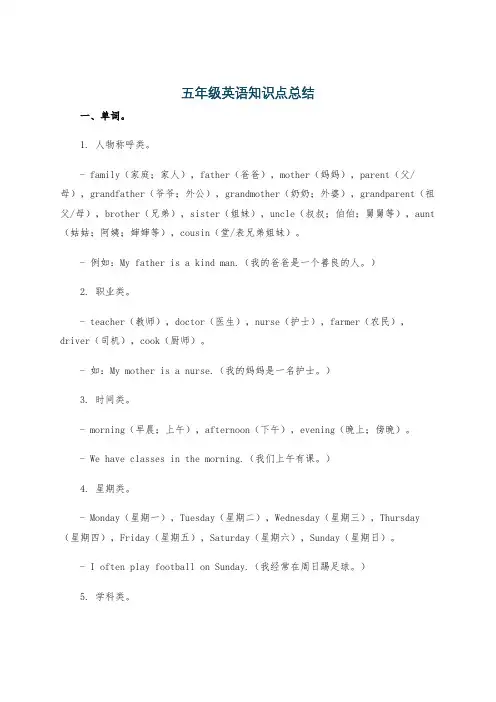
五年级英语知识点总结一、单词。
1. 人物称呼类。
- family(家庭;家人),father(爸爸),mother(妈妈),parent(父/母),grandfather(爷爷;外公),grandmother(奶奶;外婆),grandparent(祖父/母),brother(兄弟),sister(姐妹),uncle(叔叔;伯伯;舅舅等),aunt (姑姑;阿姨;婶婶等),cousin(堂/表兄弟姐妹)。
- 例如:My father is a kind man.(我的爸爸是一个善良的人。
)2. 职业类。
- teacher(教师),doctor(医生),nurse(护士),farmer(农民),driver(司机),cook(厨师)。
- 如:My mother is a nurse.(我的妈妈是一名护士。
)3. 时间类。
- morning(早晨;上午),afternoon(下午),evening(晚上;傍晚)。
- We have classes in the morning.(我们上午有课。
)4. 星期类。
- Monday(星期一),Tuesday(星期二),Wednesday(星期三),Thursday (星期四),Friday(星期五),Saturday(星期六),Sunday(星期日)。
- I often play football on Sunday.(我经常在周日踢足球。
)5. 学科类。
- Chinese(语文),English(英语),maths(数学),science(科学),music(音乐),art(美术),PE(体育)。
- My favourite subject is English.(我最喜欢的学科是英语。
)6. 形容词类。
- young(年轻的),old(年老的;旧的),funny(滑稽的;可笑的),kind (和蔼的;亲切的),strict(严格的)。
- Our English teacher is very kind.(我们的英语老师非常和蔼。
五年级英语必考知识点总结
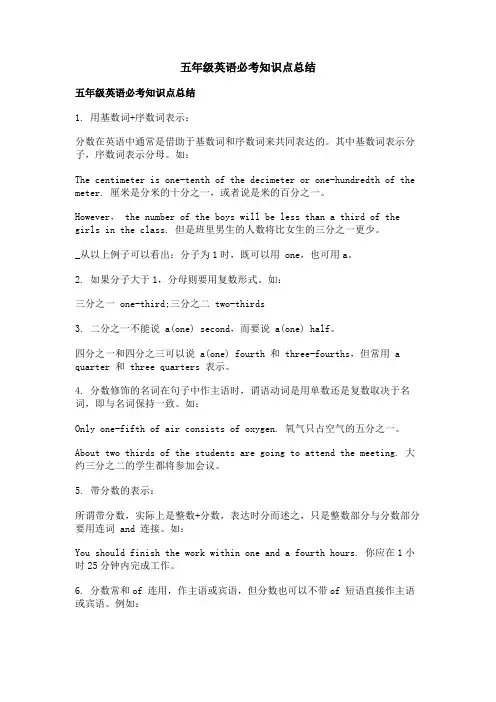
五年级英语必考知识点总结五年级英语必考知识点总结1. 用基数词+序数词表示:分数在英语中通常是借助于基数词和序数词来共同表达的。
其中基数词表示分子,序数词表示分母。
如:The centimeter is one-tenth of the decimeter or one-hundredth of the meter. 厘米是分米的十分之一,或者说是米的百分之一。
However, the number of the boys will be less than a third of the girls in the class. 但是班里男生的人数将比女生的三分之一更少。
_从以上例子可以看出:分子为1时,既可以用 one,也可用a。
2. 如果分子大于1,分母则要用复数形式。
如:三分之一 one-third;三分之二 two-thirds3. 二分之一不能说 a(one) second,而要说 a(one) half。
四分之一和四分之三可以说 a(one) fourth 和 three-fourths,但常用 a quarter 和 three quarters 表示。
4. 分数修饰的名词在句子中作主语时,谓语动词是用单数还是复数取决于名词,即与名词保持一致。
如:Only one-fifth of air consists of oxygen. 氧气只占空气的五分之一。
About two thirds of the students are going to attend the meeting. 大约三分之二的学生都将参加会议。
5. 带分数的表示:所谓带分数,实际上是整数+分数,表达时分而述之,只是整数部分与分数部分要用连词 and 连接。
如:You should finish the work within one and a fourth hours. 你应在1小时25分钟内完成工作。
6. 分数常和of 连用,作主语或宾语,但分数也可以不带of 短语直接作主语或宾语。
小学五年级英语知识点归纳总结
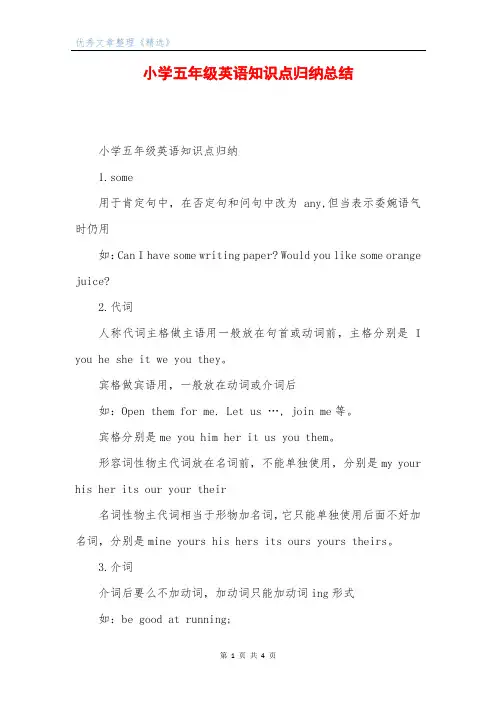
小学五年级英语知识点归纳总结小学五年级英语知识点归纳1.some用于肯定句中,在否定句和问句中改为any,但当表示委婉语气时仍用如:Can I have some writing paper? Would you like some orange juice?2.代词人称代词主格做主语用一般放在句首或动词前,主格分别是 I you he she it we you they。
宾格做宾语用,一般放在动词或介词后如:Open them for me. Let us …, join me等。
宾格分别是me you him her it us you them。
形容词性物主代词放在名词前,不能单独使用,分别是my your his her its our your their名词性物主代词相当于形物加名词,它只能单独使用后面不好加名词,分别是mine yours his hers its ours yours theirs。
3.介词介词后要么不加动词,加动词只能加动词ing形式如:be good at running;第1页共4页do well in jumping;4.时间介词季节前,月份前用介词in如:in summer;in March具体的哪一天如星期几,几月几日用介词on如:on Saturday; on the second of April; on Wednesday morning在几点钟前用介词at如:at a quarter to four;只在上下午晚上用in如:in the morning/ afternoon/ evening;但在夜间用at night。
另:季节,月份和星期前不好加the.5.名词复数构成的(方法)有规则的有:(1)直接在名词后加s如orange—oranges; photo—photos;(2) 以x, s, sh, ch 结尾的加es如:box—boxes; glass—glasses; waitress—waitresses; watch—watches;peach--peaches(3) 以辅音字母加y结尾的改y为i加es如:study—studies;library—libraries; hobby—hobbies;family—families;(4)以f, fe结尾的改f, fe 为v+es如:knife—knives; thief —thieves(注:以o结尾的我们学过的只有mango加es, mango—mangoes其余加s,)不规则的有:man—men; woman—women; people—people; child—children 6.动词第三人称单数的构成(1)直接在动词后加s如:run—runs; dance—dances(2)以s,sh,ch,o结尾的加es如:do—does;go—goes;wash—washes;catch—catches(3)以辅音字母加y结尾的改y为i加es如:study—studies; carry—carries;小学五年级英语知识点(总结)人称代词、名词所有格及序数词1、主格用来作句中的主语,用于动词前面。
五年级英语知识点总结
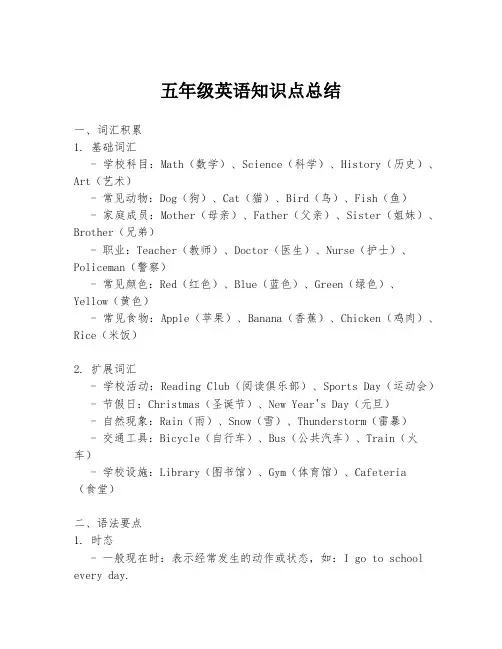
五年级英语知识点总结一、词汇积累1. 基础词汇- 学校科目:Math(数学)、Science(科学)、History(历史)、Art(艺术)- 常见动物:Dog(狗)、Cat(猫)、Bird(鸟)、Fish(鱼)- 家庭成员:Mother(母亲)、Father(父亲)、Sister(姐妹)、Brother(兄弟)- 职业:Teacher(教师)、Doctor(医生)、Nurse(护士)、Policeman(警察)- 常见颜色:Red(红色)、Blue(蓝色)、Green(绿色)、Yellow(黄色)- 常见食物:Apple(苹果)、Banana(香蕉)、Chicken(鸡肉)、Rice(米饭)2. 扩展词汇- 学校活动:Reading Club(阅读俱乐部)、Sports Day(运动会) - 节假日:Christmas(圣诞节)、New Year's Day(元旦)- 自然现象:Rain(雨)、Snow(雪)、Thunderstorm(雷暴)- 交通工具:Bicycle(自行车)、Bus(公共汽车)、Train(火车)- 学校设施:Library(图书馆)、Gym(体育馆)、Cafeteria(食堂)二、语法要点1. 时态- 一般现在时:表示经常发生的动作或状态,如:I go to school every day.- 一般过去时:表示过去发生的动作或状态,如:He visited his grandparents last week.- 一般将来时:表示将来发生的动作或状态,如:They will go on a trip next month.2. 代词- 人称代词:I(我)、You(你)、He(他)、She(她)、It (它)、We(我们)、They(他们)- 物主代词:My(我的)、Your(你的)、His(他的)、Her(她的)、Its(它的)、Our(我们的)、Their(他们的)3. 句型结构- 肯定句:The sun rises in the east.- 否定句:The sun does not rise in the west.- 疑问句:Does the sun rise in the east? / The sun doesnot rise in the west, does it?4. 简单句和并列句- 简单句:She reads a book.(她读一本书。
人教版五年级英语知识点总结
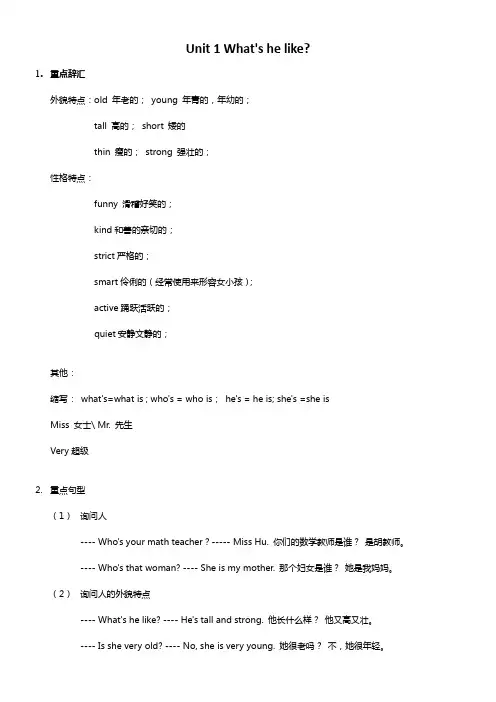
Unit 1 What's he like?1.重点辞汇外貌特点:old 年老的;young 年青的,年幼的;tall 高的;short 矮的thin 瘦的;strong 强壮的;性格特点:funny 滑稽好笑的;kind和善的亲切的;strict严格的;smart伶俐的(经常使用来形容女小孩);active踊跃活跃的;quiet安静文静的;其他:缩写:what's=what is ; who's = who is;he's = he is; she's =she isMiss 女士\ Mr. 先生Very超级2.重点句型(1)询问人---- Who's your math teacher?----- Miss Hu. 你们的数学教师是谁?是胡教师。
---- Who's that woman? ---- She is my mother. 那个妇女是谁?她是我妈妈。
(2)询问人的外貌特点---- What's he like? ---- He's tall and strong. 他长什么样?他又高又壮。
---- Is she very old? ---- No, she is very young. 她很老吗?不,她很年轻。
---- Is he very short? ---- No, he isn't. He's very tall. 他很矮吗?不,他很高。
(3)询问人的性格特点---- Is she very quiet? ---- No, she isn't. She's very active. 她很安静吗?不,她很活跃。
---- Is she very strict? ---- Yes, she is, but she's very kind. 她很严格吗?是的,可是她很和善。
人教版五年级上册英语知识点汇总
人教版五年级上册英语知识点汇总一、词汇1. 日常生活词汇•家庭生活相关词汇(如housework, chores, cleaning, cooking等)•饮食习惯与健康(如healthy, unhealthy, fruit, vegetable, junk food等)•购物与交易(如shop, market, buy, sell, price等)2. 学校与学习•学习态度与方法(如study hard, careful, practice, revise等)•学科词汇扩展(如physics, geography, history等)•学校活动与规则(如rules, library rules, school trip, sports day等)3. 自然与环境•天气与自然现象(如cloudy, foggy, thunder, lightning等)•动物与植物世界(如wild animals, rainforest, plant, tree species等)4. 情感与社交•情感表达词汇(如happy, sad, angry, excited, surprised等)•社交技能与礼仪(如invite, thank, apologize, polite, impolite等)二、语法1. 现在进行时复习与深入•巩固现在进行时的基本用法,进一步学习在不同语境中的应用。
2. 一般过去时•学习并掌握一般过去时的基本结构和用法,用于描述过去发生的动作或状态。
•句型:主语+ 动词过去式+ 其他成分3. 情态动词的初步接触•学习几个基本的情态动词(如can, could, may, might, should, must等)的基本用法和区别。
4. 简单的形容词比较级和最高级复习•复习并巩固形容词比较级和最高级的用法,注意规则变化与不规则变化。
三、句型与对话•能够围绕日常生活、学校生活、兴趣爱好等话题进行流畅的对话和交流。
五年级英语知识点梳理
一、语法知识点1.时态:一般现在时、一般过去时、一般将来时、现在进行时、过去进行时、将来进行时2.人称代词:主格、宾格、物主代词3.形容词比较级和最高级4.数词和序数词的用法5. 不定代词:some, any, no, each, every等6.疑问句的构成和回答7.可数名词和不可数名词的用法8. 情态动词:can, could, may, might, should, ought to二、词汇知识点1.常见的动词、名词、形容词和副词2.介词的用法3. 指示代词:this, that, these, those4. 时间词:days of the week, months, seasons等5.衣物、食物、家具和动物等的名称6.数字和计量单位的表达7.季节、天气、国家、城市和家庭成员的表达三、听力和口语技巧1.听力训练:听音辨词、听音选图、听音答题等2.口语练习:对话练习、角色扮演、口头作文等3.培养听力和口语的技巧:注意听力材料的重点,提高听力速度,培养正确的发音和语调等四、阅读和写作技巧1.阅读练习:理解短文的主旨和细节、找出关键词、填空等2.写作训练:书写字母、单词拼写、构造句子、写作短文等3.培养阅读和写作的技巧:阅读时注意朗读、理解词汇和句子的意思,写作时注意语法、拼写和逻辑连贯性等五、其他知识点1.四会单词:熟练掌握五年级单元中的重点单词2.句型转换:正确进行句型转换,如肯定句、否定句、一般疑问句等3.听力材料的听写:通过听写提高听力和拼写能力4.句子的改写和补充:根据给定的句子添加适当的词语或短语总结起来,五年级英语的知识点主要包括语法、词汇、听力、口语、阅读和写作等方面的学习。
通过掌握这些知识点,学生能够提高英语水平,更好地进行听说读写的综合能力训练。
五年级英语语法知识汇总 必考知识点
第4页共9页
parents 等)。
(2)一般现在时中的动词:
第一种情况:主语是第三人称单数(he she it 和其他,如 Helen 、her cousin 等),
动词后一般加 s 或 es。
第二种情况:主语不是第三人称单数,动词都用原形。
(4)一般现在时判断依据(如何判断一个句子是一般现在时):
I---eye
there----their right----write
sun----son
here---hear
who’s----whose
four----for no----know
第6页共9页
近义词: many----a lot of / lots of
large----big
photo---picture
什么颜色
问颜色
How old
多大年纪
问年纪
How many
多少数量(可数名词)
问数量
How much
多少钱;多少数量(不可数 问多少钱或数量(不可数)
名词)
五、时态 1、一般现在时 (1)一般现在时中的 be 动词: 一般用原形:am is are am 用于第一人称单数(I);is 用于第三人称单数(he she it 和其他人名或称谓,如: Ben his sister 等);are 用于第二人称单数(you)和所有复数(包括第一人称复数 we、第二人称复数 you;第三人称复数 they 和其他复数,如 the children 、 his
sit 坐 —
尾的动词,中间只 字母再加—ing
sitting
有一个元音字母,
run 跑—running
get 得到—getting
五年级英语语法知识点总结
五年级英语语法知识点总结五年级英语语法知识点总结(上):1. 名词:指人、事、物、地方、国家等具体或抽象的东西。
名词可以分为可数名词和不可数名词,可数名词有复数形式,不可数名词没有复数形式。
2. 代词:用来代替名词或名词词组的词,在句子中担任名词的作用。
常见代词有人称代词、物主代词、指示代词、不定代词等。
3. 冠词:用来限定名词的词,分为定冠词(the)和不定冠词(a/an)。
a/an用于单数可数名词前,表示“一个”,the用于特定的人、事、物前,表示“这个”。
4. 形容词:表示人或事物的性质、特征、状态等。
一般位于名词前表示定语,也可以用作表语、补语等。
5. 副词:表示动作或状态的行为方式、时间、地点、程度、频率等。
常用后置形式,修饰动词、形容词、副词等。
6. 动词:表示人或事物的动作、状态、存在等,可以分为不及物动词和及物动词。
不及物动词没有宾语,例如:run, swim等。
及物动词必须有宾语,例如:eat, drink, read等。
7. 数量词:表示数量大小的词,例如:a few, many, several, few等。
适用于可数名词和不可数名词。
8. 介词:表示时间、空间、方位等概念的词,通常与名词或代词搭配使用,例如:in, on, at, under等。
9. 连词:连接句子或词语的词,分为并列连词和从属连词。
并列连词包括and、or、but等,从属连词包括because、although、if等。
10. 句子:包括简单句、复合句和复合句。
简单句只包含一个主语和一个谓语,例如:I like ice cream。
复合句包含一个主句和一个或多个从句,例如:I like ice cream because it is delicious。
以上是五年级英语语法知识点总结的上篇内容。
接下来我们继续讨论英语语法知识点。
五年级英语语法知识点总结(下):1. 时态:表示动作或状态发生的时间。
英语常用的时态包括:现在时、过去时、将来时、现在进行时、过去进行时、现在完成时、过去完成时、将来完成时等。
- 1、下载文档前请自行甄别文档内容的完整性,平台不提供额外的编辑、内容补充、找答案等附加服务。
- 2、"仅部分预览"的文档,不可在线预览部分如存在完整性等问题,可反馈申请退款(可完整预览的文档不适用该条件!)。
- 3、如文档侵犯您的权益,请联系客服反馈,我们会尽快为您处理(人工客服工作时间:9:00-18:30)。
五年级英语下册知识点总结一、重点短语1. look at 看一看2. over there 在那边3. in English 用英语4. excuse me 打扰了5. in the pond 在池塘里6. play with 和…一起玩7. of course 当然8. swim well 游泳好9. pet shop 宠物店10. a lot of 很多11. jump through a ring 越过圆环12. ride a horse 骑马13. ride a bike 骑自行车14. climb up a ladder 爬梯子15. come here 过来16. come along 过来17. come with me 跟我来18. show… around 带…参观19. this way 这边走20. borrow … from 从…借21. borrow books 借书22. read stories 读故事23. make things 制作东西24. speak English 说英语25. draw pictures 画画26. have art classes 上美术课27. dance room 舞蹈教室28. how often 多久一次29. science lab 科学实验室30. language lab 语音室31. how many 多少32. other activities 其他活动33. do experiments 做实验34. do listening 练听力35. observe things 观察事物36. do speaking 练口语37. New Year’s Day 元旦38. meeting hall 会议大厅39. Children’s Day 儿童节40. be good at 擅长41. be interested in 对…感兴趣42. music club 音乐俱乐部43. no one 没有人44. play the violin 拉小提琴45. art club 美术俱乐部46. come into 进入47. listen to music 听音乐48. cut out 剪下49. come from 来自50. up and down 上上下下51. in groups 成组52. science corner 科学角53. group work 小组活动54. do project work 做项目制作55. art corner 美术角56. computer corner 电脑角57. play football 踢足球58. be famous for 因…闻名59. study plants and animals 研究动植物60. do exercises 做运动61. on the field 在操场上62. do printing on the paper 在纸上印刷63. how about …怎么样?64.go on field trips 田野考察65. play volleyball 打排球66. play basketball 打篮球67. play hockey 打曲棍球68. play rugby 打橄榄球69. in the forest 在森林里70. have a look at 看一看71. here you are 给你72. how much 多少(钱)73. a pair of 一双;一对74. try on 试穿75. shoe shop 鞋店76. clothes shop 服装店77. make a shopping list 做购物单78. sports shop 体育用品商店79. cake shop 蛋糕店80. pay for 付钱81. feel well 感觉好82. see a doctor 看医生83. take good care of 好好照顾84. have a bad cold 得了重感冒85. have a fever 发烧86. have a stomachache 胃疼87. have a headache 头疼88. have a toothache 牙疼89. have a cough 咳嗽90. go to a concert 听音乐会91. do maths problems 做数学题92. go to the music club 去音乐俱乐部93. have to 不得不94. stay in bed 待在床上95. get well 康复96. be worried about 担心97. don’t worry 别担心98. help … with 帮助…做某事99. in the hospital 在医院里二、重点短语讲解6. play with 和…一起玩play with sb.(某人) 和…一起玩play with sth.(某物) 玩某物e.g. Lucy and Lily are playing with their mother.e.g. Lucy and Lily are playing with their doll.10. a lot of 很多a lot of = lots of + 可数名词复数或不可数名词e.g. 同义句转换There are a lot of apples on the table. = There are ______ ______ apples on the table. (答案:lots of) 28. how often 多久一次how often 是一个特殊疑问词,就频率提问。
英语表示频率的词:一次:once两次:twice 特殊其他次数:基数词+times 构成例如:8次eight timese.g. --How often do you go to the library?--I go to the library once a week. (注:如就划线部分提问,应用特殊疑问词how often)31. how many 多少how many/much 就数量提问how many + 可数名词;how much + 不可数名词e.g.-- How many boys are there in your class?-- There are 40 boys in my class.-- How much water is there in the bottle?-- There is a little water in the bottle.40. be good at 擅长at 后可加名词如加动词,动词应用动名词形式既v + inge.g. I am good at English.Penny is good at English.Penny and Tom are good at English.I am good at swimming.Penny is good at playing football.Penny and Tom are good at playing the violin.41. be interested in 对…感兴趣in 后可加名词如加动词,动词应用动名词形式既v + inge.g. I am interested in English.She is interested in Chinese.We are interested in Maths.I am interested in going on field trips.He is interested in studying in the forest.They are interested in going shopping.44. play the violin 拉小提琴乐器前加定冠词the47. listen to music 听音乐听…,用listen to听音乐音乐前不加定冠词the 听收音机收音机前要加定冠词the :listen to the radio 49. come from 来自come from = be fromI come from China. = I am from China.易错点:Where are you come from? (错误) Where do you come from? (正确)57. play football 踢足球球类名词前不加冠词58. be famous for 因…闻名70. have a look at 看一看have a look at = look at72. how much 多少(钱)how much 用来询问价格73. a pair of 一双;一对a pair of glasses; a pair of trousers; a pair of gloves74. try on 试穿试穿鞋子try on the shoes = try the shoes on试穿它此处它是代词,只能放在try on 之间try it on82. see a doctor 看医生常用表示“看”的单词有:watch; see; look; readwatch: 用于看电视;比赛等watch TV watch football matchsee: 看见强调结果,看到什么;看医生、看电影时用see ; see a film; see a doctor 83. take good care of 好好照顾take (good) care of = look after85. have a fever 发烧have a + 表示症状的单词have a fever; have a toothache; have a headachehave + 病名have measles (麻疹) have mumps (腮腺炎)93. have to 不得不Her mother is ill, she has to look after her mother, so she can’t come to the party.重点:含有have to 的句子变否定用don’t 或doesn’te.g. She has to finish her homework.She doesn’t have to finish her homework. (正确) She has not to finish her homework.(错误) 96. be worried about 担心She is worried about her exam.98. help … with 帮助…做某事help …with = help sb. (to) do sth.Peter helps her mother with the housework. = Peter helps her mother (to) do the housework.三、重点单词用法1. call v. 称作What do you call it in English?2. like v. 喜欢sth. I like English very much.like to do sth. I like reading very much, but I don’t like to read now.doing sth.3. let’s + 动词原形Let’s (=let us) make animals.let sb. do sth. 让某人做某事4. want v. 想,想要want sth. I want a piece of paper.to do sth. I want to watch TV.5. 情态动词情态动词很简单,没有人称数之变,动词原形后边站,can表能力may许可should应该would愿must 必须,否定needn’t换have to不得不表客观四、重点语法一般现在时1. 概念:一般现在时表示经常的、习惯性的动作或存在的状态。
